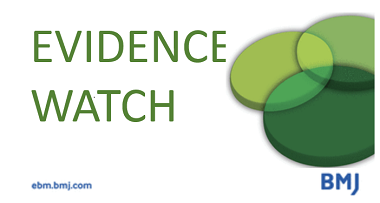Most surrogate outcomes in cancer studies have little – if any – connection with overall survival, which is affecting patient care and leading to the approval of treatments that don’t work.
Carl Heneghan

Surrogate markers are often used in an attempt to predict the real outcome of interest such as death. Because they are cheaper to measure and shorten the duration of trials their use has become widespread in the approval of drugs: an analysis of 626 RCTs reported one on six trials used a surrogate primary outcome. But their over-interpretation leads to misinterpretation of the evidence as the surrogate outcome may not reflect important changes in the patient-relevant outcome – the outcome that matters.
I’m getting tired of repeating this message about surrogates. In 2017, an analysis of FDA approved cancer drugs found a lack of clinically meaningful outcomes in many postmarket cancer studies due to the overuse of surrogates. Despite this lack of clinically meaningful benefit most of the cancer drugs retain FDA approval.
Focussing on surrogate outcomes in trials may also prove to be harmful. Early trials of the diabetes drug rosiglitazone reported lower blood glucose (the surrogate), but later studies found the drug actually increased cardiovascular events, leading to its subsequent withdrawal in the EU.
I was therefore interested and concerned, to read a recently published systematic review of RCTs evaluating the strength of correlation between overall survival and surrogate markers. This review found 78 studies reporting correlations in 89 settings. Only 11 (12%) of these studies found a high correlation with overall survival; 34 (38%) reported low correlations. Restricting the analysis to studies published after 2015 found similar results: only four studies (11%) had high correlations.
Different researchers may disagree on what constitutes a strong or weak correlation but we can all agree the results are dire. Low-quality surrogates have taken over in the field of cancer drug approvals. They are now the norm. And it gets worse in breakthrough therapy designation: the approval pathway which expedites development and review of drugs for serious or life-threatening conditions. An analysis found that 96% of 46 drugs approved for breakthrough designation relied on a surrogate end-point.
This reliance on surrogates is misguided, in some cases, harming patients, and blocking the path to effective treatments based on robust evidence and outcomes, The use of surrogates in cancer trials should be limited to rare cancers and where there is a validated meaningful endpoint. We need a radical overhaul of the current approval system for cancer drugs- a mandate for meaningful clinical endpoints.
Reference:
A systematic review of trial-level meta-analyses measuring the strength of association between surrogate end-points and overall survival in oncology. Eur J Cancer. 2019 Jan;106:196-211. doi: 10.1016/j.ejca.2018.11.012. Epub 2018 Dec 5.
BMJ Evidence-Based Medicine – original evidence-based research, insights and opinion
Read more in the Welcome to BMJ Evidence-Based Medicine Editorial.

Competing interests
Carl has received expenses and fees for his media work including BBC Inside Health. He holds grant funding from the NIHR, the NIHR School of Primary Care Research, and The NIHR Oxford BRC. He has also received income from the publication of a series of toolkit books. CEBM jointly runs the EvidenceLive Conference with the BMJ and the Overdiagnosis Conference with some international partners which are based on a non-profit model. he is a clinical advisor to the UK Gov’ts All Party Parliamentary Group (APPG) on surgical mesh.
Full disclosure see here:
